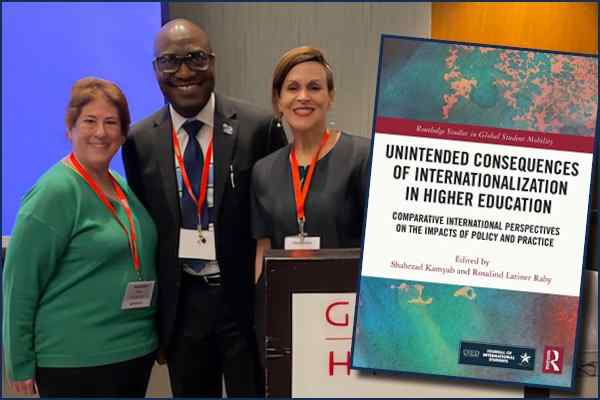Dickinson State University (DSU) proudly announces that Dr. Ayodeji Arogundade, Dean of the School of Business and Entrepreneurship, has co-authored Unintended Consequences of Internationalization in Higher Education: Comparative International Perspectives on the Impacts of Policy and Practice. This groundbreaking book recently earned the 2024 Best Book Award from the Council on International Higher Education (ASHE-CIHE) for its significant contributions to research on international higher education.
About the Council on International Higher Education and ASHE
The Council on International Higher Education (CIHE) is one of four councils under the Association for the Study of Higher Education (ASHE), a U.S.-based scholarly organization committed to advancing the study of higher education. Established in 1976, ASHE emerged from the former American Association for Higher Education (AAHE). Today, ASHE supports higher education researchers through its annual conference and publications, including the Review of Higher Education, which is published by Johns Hopkins University Press.
CIHE’s Best Book Award celebrates research that offers groundbreaking insights into the field of international higher education. Winning works must demonstrate meaningful impact on policy, practice, theory, or research and meet the highest standards of social science research.
Focus of Dr. Arogundade’s Award-Winning Book
Dr. Arogundade’s book examines the rising trend of student mobility and the growing efforts by institutions worldwide to internationalize their teaching, research, and curricula. However, alongside the many benefits, internationalization can also lead to unintended consequences—both positive and negative.
The book features contributions from scholars across Africa, Asia, Europe, Latin America, the Middle East, and North America, offering comparative perspectives on the impacts of internationalization policies. It highlights how these policies influence curricula, research, mobility initiatives, and teaching practices, uncovering common challenges and best practices for sustainable, equitable internationalization.
Using a critical lens, the book explores internationalization’s potential to foster learning, entrepreneurship, and knowledge exchange. However, it also addresses paradoxes and dilemmas that arise, such as ethical concerns and political tensions for individuals, communities, and institutions.
Insights and Motivation Behind the Project
Dr. Arogundade’s decade of experience in higher education, along with his time serving on the Board of International Programs at a previous institution, inspired him to contribute to this research. “I was excited to be part of this project,” said Dr. Arogundade. "Internationalization can produce both benefits and challenges, such as brain drain or financial capital flight, but it can also bring unexpected advantages."
Some unintended positive outcomes highlighted in the book include:
- Brain gain
- Enhanced academic quality
- Increased global rankings
- Greater institutional revenue
- Broader use of technology
“My motivation for collaborating on this project,” Dr. Arogundade shared, “was to understand these consequences better and explore how institutions can harness the positive aspects of internationalization while mitigating its negative impacts.”
Celebrating Excellence at DSU
DSU is proud to celebrate Dr. Arogundade’s achievement and the recognition of his research, which is shaping international conversations in higher education. His work not only illuminates the complexities of global academic collaboration but also offers valuable insights for institutions striving to balance the benefits and challenges of internationalization.
Dr. Arogundade’s success reflects DSU’s commitment to research and academic excellence, further elevating the university’s presence on the global stage.

